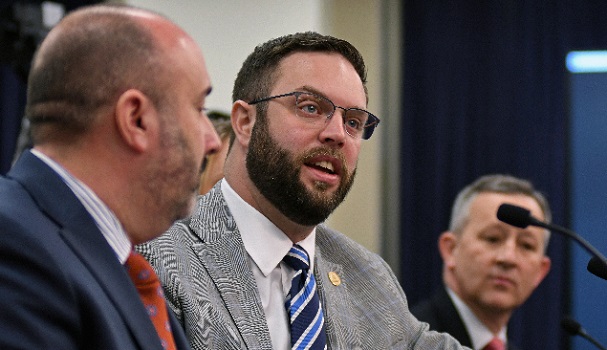
Photo from Thursday’s House Elections, Constitutional Amendments and Intergovernmental Affairs Committee showing Rep. Michael Meredith, R-Oakland, between J.D. Chaney, executive director and CEO for the Kentucky League of Cities, and Jim Henderson, executive director and CEO of the Kentucky Association of Counties, testifying on House Bill 475.
FRANKFORT, KY (February 17, 2022) — Kentucky voters may soon decide whether or not the Kentucky General Assembly can allow local governments to charge new types of taxes.
House Bill 475 cleared the House Elections, Constitutional Amendments and Intergovernmental Affairs Committee on Thursday. Rep. Michael Meredith, R-Oakland, is the primary sponsor of the bipartisan measure.
Currently, Section 181 of the Kentucky Constitution limits the types of taxes local governments can charge. Meredith said most cities, counties and municipalities survive on occupational tax and property tax revenue.
“If we want to remove the over reliance on occupational tax or income-based taxes at the local level, this is a move we must make,” Meredith said. “If we want to provide more flexibility to our local governments in setting the course for their future, this is a change we must make.”
For example, changing the constitution would give the General Assembly the power to approve legislation that would allow local governments to implement a 1% local sales tax.
In referencing calls for comprehensive tax reform, Meredith said HB 475 is an essential piece to accomplishing that goal.
“There’s no way to truly do comprehensive tax reform if we don’t address the local side as we address the state side,” Meredith said.
Meredith was joined by J.D. Chaney, executive director and CEO for the Kentucky League of Cities; Shelby Somervell, vice president of government affairs and communications for Greater Louisville Inc.; Andi Johnson, chief policy officer and director of regional engagement for Commerce Lexington; and Jim Henderson, executive director and CEO of the Kentucky Association of Counties, in testifying in favor of HB 475. They believe this measure will lead to much needed population and industry growth and will make Kentucky more competitive with its neighbors.
If HB 475 receives approval from the House and the Senate, Kentucky voters will decide on the proposed change to the constitution during the November 2022 general election.
If voters approve, that’s where Meredith hopes House Bill 476, a separate bill that was approved by the House Local Government Committee on Wednesday, would kick in. HB 476 is not a proposed constitutional amendment.
Meredith said HB 476 “keeps the status quo and ensures that every county, city or other local government can continue charging any of the taxes or fees that they’re authorized to do in statute currently, but they couldn’t expand to anything new,” until the General Assembly authorizes them to do so.
House Minority Floor Leader Joni L. Jenkins, D-Shively, asked the panel if there are any guardrails in place to make sure the gap between “poor” counties and “rich” counties doesn’t increase.
Henderson said the changes proposed in HB 475 could benefit every county in the state in a significant way since counties that already do not generate much occupational tax revenue, if any, could benefit from a local sales tax.
Shannon Stiglitz, senior vice president of government affairs for the Kentucky Retail Federation, shared with the committee the organization’s concerns with the possibility of a local sales tax and how that might impact businesses and consumers.
In voting “yes” on HB 475 in committee, Rep. Jason Nemes, R-Louisville, said he shares a lot of the Kentucky Retail Federation’s concerns, but he believes the bill has the potential to alleviate property tax burdens on local families by giving cities and counties more options. He also believes this change will lead to growth.
“Our tax policy in Kentucky needs to be toward growth,” Nemes said. “We are a poor state. We are poor counties and poor cities. We can’t pay for our roads. We can’t pay for our schools the way we want to. We can’t pay for the healthcare we want to unless we have growth.”
HB 475 and HB 476 will now go before the full House for consideration.
END









